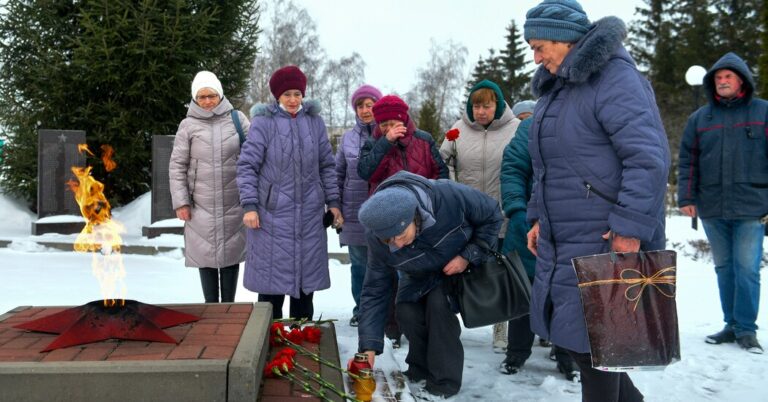Ukrainian officials pressed their efforts on Thursday to uncover the details of a deadly plane crash over the border in Russia, asking for patience from citizens while they investigated Moscow’s claims that Ukraine had shot down a Russian military aircraft carrying Ukrainian prisoners of war.
President Volodymyr Zelensky of Ukraine called for his country’s intelligence agency to determine what had happened and for an international investigation into the crash, while also accusing Russia of engaging in wartime propaganda over the episode.
The crash, and Russia’s claims that Ukraine had downed a plane with its own soldiers aboard, poses a vexing challenge for a government in Kyiv trying to brace its citizens for a third year of war. Ukraine is on the defensive on the battlefield and contemplating a new mobilization that would likely be domestically unpopular, while striving daily to shore up critically needed Western support.
The plane went down in the Belgorod region near the border with Ukraine, killing all onboard, the Russian Ministry of Defense and the regional governor said on Wednesday. The ministry said that the plane had been carrying 65 Ukrainian prisoners of war who were to be released in a prisoner exchange. The Russian claims could not be independently verified.
The cause of the crash remains unknown, though Ukrainian officials have not denied shooting down the aircraft. They say they cannot confirm that Ukrainian soldiers on their way to a prisoner exchange were aboard the plane.
But the Ukrainian military intelligence agency on Wednesday hinted at the possibility of a tragic mistake, acknowledging that a swap had been planned and saying in a statement that Russia had not warned Ukraine’s military that prisoners of war were being transported to the border — as it had in previous exchanges.
On Thursday, the chairman of the defense committee in the Russian Parliament, Andrei V. Kartapolov, disputed Ukraine’s version of events, saying that Moscow had told the Ukrainian military the plane carried prisoners of war, though with short notice.
Ukraine’s military intelligence agency, he said, was “officially warned” 15 minutes before the plane approached the border region. There was no way to independently confirm the assertion.
The diverging versions highlight one of the defining features of the war: a persistent lack of clarity, with facts obscured by misinformation and competing agendas. Russia pushes its preferred messaging for propaganda purposes at home and abroad. Ukraine is reluctant to disclose any military setbacks. Tragedies and turning points in the war have been clouded by uncertainty, sometimes for weeks or longer.
Officials in Kyiv have said that it is too early to draw conclusions about the crash and that relatives should await confirmation from the authorities in Ukraine. “We have not seen any signs of this number of people aboard the plane, whether Ukrainian citizens or not,” Dmytro Lubinets, the country’s human rights ombudsman, told news media on Thursday.
Ukraine’s domestic intelligence agency said on Thursday that it had opened an investigation into the plane crash as a possible war crime, without providing any indication of how it would do so.
Ukraine has also requested that the Red Cross and United Nations be granted access to the crash site. The United Nations and Red Cross did not immediately respond to questions on Thursday about that possibility.
Under the Geneva Conventions — the treaties laying out the rules of war and treatment of prisoners — Russia is obliged to notify the Red Cross of movements of prisoners, Mr. Lubinets said. Russia, he added, bears “full responsibility for the life and health of prisoners of war.”
Ukraine’s government, he said, has asked the Red Cross if it had advance notice of the prisoners’ trip to the border region, which is an active combat zone.
Complicating any investigation by Ukraine is the fact that Russia possesses most of the key details about the episode, including who was onboard. Ukrainians are deeply skeptical about any information emanating from Russia, which they see as being determined to twist the crash into a painful ordeal for families of prisoners.
Dmitri S. Peskov, the Kremlin spokesman, asserted again on Thursday that Ukraine had shot down its own soldiers and called it a “monstrous act.” The incident, he said, cast doubt on the prospects for future prisoner exchanges.
Groups that monitor Russian propaganda say Moscow is pushing a message aimed at the West: that Ukraine cannot be trusted with long-range weaponry. Russians posting on social networking sites have blamed Ukraine for killing its own people.
On Wednesday, Mr. Zelensky said in his nightly video address, “It is obvious that Russians are messing with the lives of Ukrainian captives, the feeling of their relatives, and the emotions of our society.”
The Institute for the Study of War, a U.S.-based organization, wrote in an analysis that Russian propagandists were “seizing on the Il-76 crash to sow domestic discontent in Ukraine and undermine Western will to continue giving military support to Ukraine.”
Hanna Chabarai, an analyst of Russian propaganda at the Institute of Mass Information, an independent organization in Ukraine, noted, “The microphone is in the hands of Russia.”
“This is emotional terrorism because relatives and friends of prisoners of war are very scared,” she added.
International organizations, courts and independent news investigations have repeatedly debunked Russian claims about the war, disproving Moscow’s denials that it shot down a civilian airliner over eastern Ukraine in 2014 and blew up a major dam on the Dnipro River last year.
An explosion in July 2022 at the Olenivka camp for Ukrainian prisoners of war killed at least 51 detainees and prompted a monthslong effort by Ukraine and international organizations to ascertain what had happened.
Russia asserted that Ukraine had hit the site with an American-provided rocket. But a United Nations investigation eventually determined that an American rocket could not have struck the site and faulted Russia for detaining prisoners of war near the front line.
Maria Varenikova and Ivan Nechepurenko contributed reporting.

